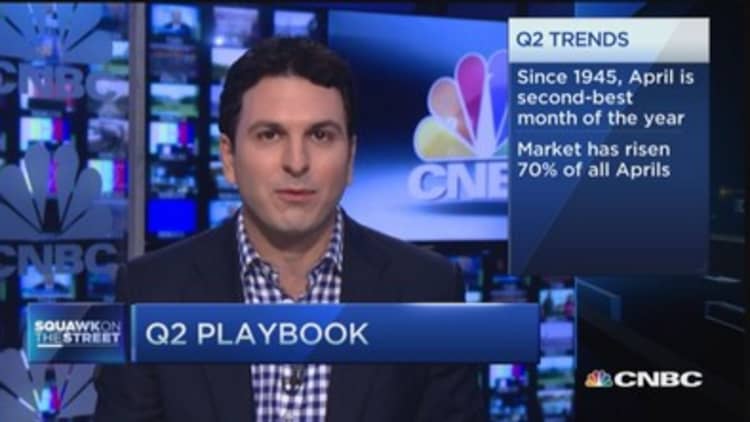
Wednesday marks the start of the second quarter, and if the calendar is to be believed, it could lead the way for a bounce in the markets.
Past performance, of course, does not predict future returns, and, yes, there are lots of people who think calendar and seasonality analysis is silly, but there are some compelling trends worth nothing as the markets move into April.
The economic synching of the calendar can be traced back centuries. According to a paper by two New Zealand economists who researched U.K. markets going back 300 years, the famous "January effect" didn't actually occur until the 1830s, once Christmas became an official holiday. So there is some validity that specific changes to the calendar can lead to predictable outperformance in the markets. The research even showed how "a sell-in-May trading strategy beats the market more than 80 percent of the time over five year horizons."
According to an analysis by market data firm Kensho, the second quarter of the third year in a presidential cycle has been positive 100 percent of the time since 1980. The S&P 500 has averaged a 7 percent return and the Dow up 8 percent.
Broader second-quarter themes
Even expanding beyond the presidential cycle, April is the key to a strong second quarter. "If results are favorable for the market in Q2, as they have been historically, it will likely be due to the strong performance in April," said Sam Stovall of S&P Capital IQ. His analysis shows that April is the second best month of the year since 1945, averaging 1.53 percent. Since World War II, "the market has risen in nearly 70 percent of all Aprils."
Stovall's data also showed that all 10 market sectors have averaged a positive return in April, led by health care (up 3.5 percent), followed by energy and technology.
Tax Day
Much of the focus on April's returns stems from the April 15 IRS tax deadline. As Bespoke Investment Group's Paul Hickey said in The Wall Street Journal on Wednesday, the second half of April is key to April's returns. In the first two weeks, people are selling securities to raise funds to pay off their taxes, but the next two weeks can be attributed to investors receiving refunds and putting them to work in the markets.
DISCLOSURE: NBCUniversal, parent of CNBC, is a minority investor in Kensho.


